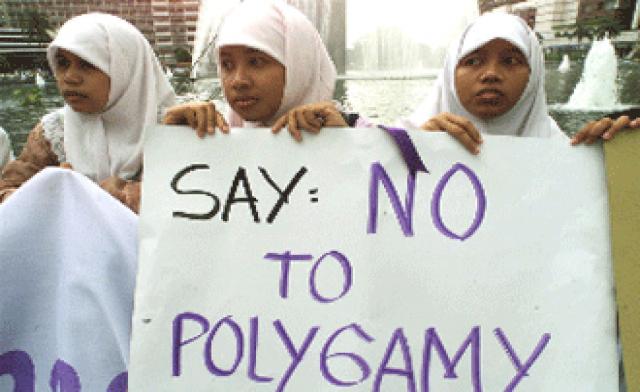 I recently came across the blog of a local Utah woman of color who has started an advocacy group, Big Ocean Women for maternal feminists in support of traditional family, natural motherhood (no surrogacy or IVF), against abortion, anti-pornography and against sex education in schools. Promotion of polygamy, child marriage, and protection of rapists were not identified as platforms.
I recently came across the blog of a local Utah woman of color who has started an advocacy group, Big Ocean Women for maternal feminists in support of traditional family, natural motherhood (no surrogacy or IVF), against abortion, anti-pornography and against sex education in schools. Promotion of polygamy, child marriage, and protection of rapists were not identified as platforms.
Unfamiliar with the term maternal feminist, I followed links on Big Ocean blog and learned that maternal feminism recognizes that the sexes are different but equal, espousing a complementarian philosophy of gender roles. I also learned about the sister organization, United Families International which trains Mormon women (and other faiths) to attend the annual meeting of the United Nations Commission on Women to advocate for traditional marriage and against practices viewed as anti-family.
Both Big Ocean Women and the UFI website lament that meetings of the United Nations Commission on Women are overrun by radical feminists screaming and wearing masks as they try to silence the voice of religious people and traditional mothers. UFI lists sympathetic countries they have provided with tools for defending traditional family at past meetings of the United Nations Comission on Women, including: Algeria, Benin, Canada, Central African Republic, Ghana, Kenya, Lebanon, Mozambique, Nigeria, Palestine, Papua New Guinea (Indonesia), Philippines, Poland, and Senegal.
What does traditional marriage look like in the countries UFI and Big Ocean Women support? Canada and Poland are similar the United States in marriage practices. But in the other ally countries, traditional marriage looks very different. In Algeria, polygyny is legal. Traditional marriage looks more like the early days of Mormonism or a fundamentalist version of the LDS faith.
In Benin, the Central African Republic, Ghana, Kenya, Lebanon, Nigeria, Mozambique, State of Palestine, Papua New Guinea, Philippines and Senegal child marriages to brides under 18 years of age and in some countries under 15 years of age are common.
Traditional marriage looks like a grown man marrying a child.
Additionally, in the State of Palestine if a man rapes a child all charges are dropped as long as he marries the child.
Mormon women advocating for traditional marriage are (hopefully unwittingly) allied with countries with high rates of protected child marriage, polygyny, and in the case of Palestine, exoneration of child rapists through marriage between the perpetrator and their victim.
A better mission for Mormon women would be to lobby for an end to traditional marriage as it is practiced in much of the world. One-third of the women in developing countries married before age 18 while 1 in 9 married before age 9. These traditions are the “evil traditions of the fathers” that the Book of Mormon warns against.
Adolescent pregnancies have higher rates of mortality for both infants and their mothers. Child mothers (especially malnourished ones) are prone to prolonged labor and obstetric fistulas. These are holes that open up during labor, either between the rectum and vagina or bladder and vagina. Corrective surgery is not easily available in most developing countries, resulting in a lifetime of leaking feces or urine. This embarrassing condition results in ostracization, shaming, and banishment for the women who suffer from obstetric fistulas.
Mormon women who want to make the world a safer and happier place for children and their families could do some fundraising for Utah-based IVU-Med that sends doctors and nurses to train local medical personnel in developing countries to perform surgeries that repair conditions such as obstetric fistulas. Liahona Children’s Foundation is an organization that works to provide nourishment and medical treatment for malnourished Mormon children. Many other organizations are actively working to end traditions of child marriage and promote healthy pregnancies for adult women (not children), in households with one wife.
Mormons have no business making political alliances to protect traditional marriage with countries that define traditional marriage as a marriage to a child or to multiple wives.
What organizations do you support that are working to end child marriage, polygyny, or otherwise benefit women and children? I am a supporter of GIRLS not Brides.







12 Responses
Wow, Crulest Month, I’d never heard of a maternal feminist before. I can’t understand why any kind of feminist would ally themselves with these kinds of traditional marriage, other than to make their presence bigger at the UN Commission on Women meeting. Talk about a Faustian bargain.
Thanks for all the links on ways to help.
I’m not sure what you’re railing against. Is there anything in the documents of these groups that support child marriage, or even polygyny? Since they are trying to change what is “traditional” in these other countries to what they consider “traditional”, isn’t that a good thing? Do you really think they are trying to implement more child marriage?
It just seems to be a weird post, saying “they’re doing feminism wrong” and “they should do it my way”. Isn’t there room for more than one way?
Frank, there is always room for “more than one way” provided the alternate views do not actively support and promote evil, abusive practices. By throwing their lot in with “traditional marriage” advocates from places like Benin, where “traditional” means male dominated, adult/child, polygamist relationships, these “feminists” have shown their true colors. Their “alternate viewpoint” is abhorrent and demands our condemnation, not our tolerance. I can only hope that these women are ignorant of the plight of their sisters in these countries. If they are are aware and choose to ally themselves anyway, then they are as culpable as those who commit these crimes against women and children.
Frank,
UFI and Big Ocean are sharing resources with countries to defend “traditional marriage” because they share a hatred for gay marriage. Not because the share a vision of marriage between two heterosexual consenting adults. I wish that this union also included an effort to sway child marrying countries away from their version of traditional marriage to one that does not include children. I wouldn’t have written this blog if there was any indication that UFI and Big Ocean are working to end child marriage as they promote “traditional marriage.”
I’m indignant because people of my faith are giving out lobbying guides with helpful hints on how to prevent the UN from legislating against traditional marriage as you define it in your country (even if your country defines marriage in a child abusing kind of way). Although a nice lady from Big Ocean might say to the ambassador of Niger, “Here is a guide that will help you defend marriage against the worldly voices in the UN. It will show you how to legislate without mentioning religion.” My concern is that the ambassador from Niger hears, ” This guide will help you to continue child marriage in your country and stop the UN from interfering in the way your people traditionally marry.” They are working under the banner of traditional marriage with very different definitions of what it means.
Providing support for traditional marriage to countries that protect child marriage, polygyny, and exoneration for child rapists is wrong. I don’t mean they are doing feminism wrong. I mean it is wrong to support “traditional marriage” when a large portion of the world defines traditional marriage to include children.
You seem to have missed what their sites actually said. You even missed their most recent blog post interviewing the woman from the National Coalition to End Sexual Exploitation. For BoW, their “10 points” include:
An international frame of policies of protection for working women who want to have children or are dedicated exclusively or partially to the care and attention of their family and the eradication of any form of discrimination towards them
Saying that their work is invalid if they work trying to improve Nations doing bad things is like people saying Mormon feminists work is invalid because they’re part of a patriarchal organization.
If your beef is that they’re against SSM, go with that. Don’t attribute evil to the good work they are trying to do, just because you don’t like some aspect of it.
I don’t think they are trying to improve conditions, Frank.
I met a woman once who was interested in taking the discussions (long story involving visiting teaching as to how I met her.) I picked her up and took her to a Relief Society activity.
There, the women shared how they had met their husbands. She said she became drunk, and when she woke up, her brothers had sold her to the man she was now married to. She was from PNG, and they had recently immigrated to Australia. This way of meeting a spouse was normal for her. It was shocking for her to think that the other women there had a choice of who we married. It weirded her out so much that she said she could not participate in the “freedom of sex in your church” (as in, we could choose who we wanted to marry and have sex with). She feared be beaten if she discussed this degree of sexual freedom at home because she wanted to be a mother, and any appearance of her having a choice of marital partners was akin to making a political statement against motherhood. She was frightened as I dropped her off, and disappeared after that.
I don’t think this organization understands what it says it is defending from the point of view of the women it says it is trying to defend. It is scary. Very scary. And not something I think that the church, or feminists should associate with whatsoever.
Frank, I don’t think we are communicating very effectively. I have seen the recent blog posts. My beef with them isn’t SSM. My concern is that in the United States a conservative group can say traditional marriage and we all know they mean one man and one woman. But on the global stage, traditional marriage does not mean one man and one woman. It means one man and one girl or many girls or many women.
I doubt the intent of either organization is to promote child marriage and polygamy. But that is exactly what they do when they help other countries to defend traditional marriage at the UN. They need a different marketing campaign for international outreach. While intending to do good, they are joining hands with countries that practice child marriage.
Terrific points, April. I hope that Big Ocean Women see this post and rethink their alliances with organizations promoting traditional marriage in countries where traditional marriage includes child brides and polygamy. They should also consider adding on anti-polygamy, anti-child marriage, and anti-rapist protection platforms.
This post is a good reminder about what challenges family and marriage face in much of the world. How I wish instead of focusing on consenting adults of the same sex our church focused on non-consenting, non-adult marriages that are the norm in many countries.
How interesting, too, that our church once championed non-traditional marriage in a way that shocked and disgusted society. We’ve certainly turned a corner on that front.
I see the call for an end to surrogacy on the grounds they feel it is a new form of human trafficking, but I’m not seeing where they are opposed to IVF? And natural motherhood would exclude adoption, too, right? I just wondered where those stances are posted because it would REALLY surprise me to see a group of conservative LDS women opposed to fertility treatments or adoption. Given how common infertility struggles are, I would bet that several of the “Big Ocean” women have built their own families through such efforts.
On another note, I’m so confused by their website and purpose. I can’t make heads or tails of it and this blog post is just plain scary: http://www.donotlink.com/framed?660020
Ooops…I don’t think the link worked above: http://blog.bigoceanwomen.com/2015/03/interview-with-dr-judith-reisman-and.html
Great post! I think your points are very valid. If a group like this is going to advocate on a global scale, I think it is absolutely necessary that they understand what their platform means to people of other nations. The idea of traditional marriage feels wrong to me even just in my Mormon American culture, but it is absolutely abhorrent when you look at traditional marriage globally. Really great thoughts to consider!